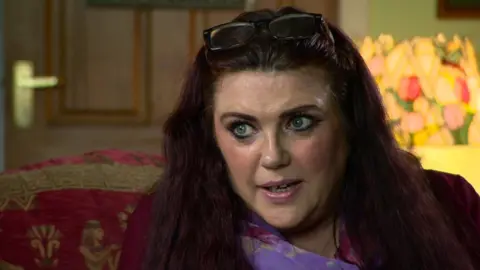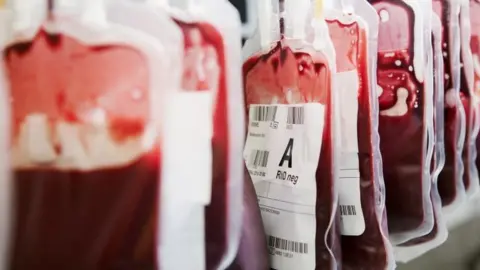Contaminated blood report 'full of lies'
 BBC
BBCGovernment officials have apologised for using a discredited report into the contaminated blood products scandal that left thousands of NHS patients infected with viruses including HIV.
Despite assurances that the "inadequate" document would be ditched, a health minister has referred to it this year, the BBC can reveal.
The government admits that the document was used for too long.
This week it will announce who will run its official inquiry into the scandal.
Critics say the whole process has taken far too long and have accused the government of a "whitewash".
Campaigners have always said that the 2006 report - originally billed by the government as an official account of how the scandal unfolded - was misleading and incomplete because original documents had been destroyed.
Contaminated blood
It has been called the worst treatment disaster in the history of the NHS.
At least 2,400 people died after they were given blood products that were infected with hepatitis C and HIV during the 70s and 80s.
Thousands of NHS patients with an inherited bleeding disorder called haemophilia were given the plasma products, which came from abroad, including the US.
 SPL
SPLMuch of the plasma used to make the clotting treatment Factor VIII came from donors like prison inmates in the US, who sold their blood.
Carol Grayson's husband, Peter, was one of the victims who died.
She says campaigners have challenged the Department of Health over its investigations for more than a decade.
She told BBC News: "I had to give my career up to care for my husband for many years and I didn't have my own children because at the time I wanted to conceive, I was told I might infect the child and the advice at the time was, don't have children. So there are huge implications for families. It doesn't just impact on one person, it impacts on the whole family.
"I go from being absolutely furious and thinking everything I was brought up to believe in, you know about democracy, about justice is a lie."
The investigation
In July, the prime minister ordered the Cabinet Office to oversee the independent investigation into how the scandal happened, after family members warned that the involvement of the Department of Health would mean it would be, in effect, investigating itself.
The BBC has now seen a series of letters from ministers and civil servants, accepting that the 2006 report (Self-Sufficiency in Blood Products in England and Wales) previously seen within Whitehall as a "definitive account", was inadequate.
Sir Chris Wormald, permanent secretary at the Department of Health, wrote to Liberal Democrat peer Lady Featherstone in August assuring her that the document "has not been used by officials in recent years… and it will not be used in the future".
But the BBC has also seen a letter written by health minister Lord O'Shaughnessy to another MP in January this year, which referenced the report and its conclusions.
When this was brought to Sir Chris's attention, he apologised, and said there were "some instances in recent years where the department had referred to the document" and reiterated the assurance that the document would be taken out of use.
Lady Featherstone told the BBC that civil servants promised to make clear online that the document had been discredited, but this was not yet apparent.
The peer, whose own nephew died from an infection from contaminated blood products, said: "That document is full of holes, and lies, and mistruths, and lines to take, and I went to the Department of Health to challenge the use of this document.
"I think the permanent secretary was quite genuine in his desire - he saw that the evidence proved that they couldn't use the document - and he wrote to me to assure me that this document was not being used any longer, had not been used in recent years and would never be used again in the future.
"It indicated to me that they knew it was wrong, that they must have acknowledged it was telling untruths."
A Department of Health spokesperson said: "The 2006 document, Self-Sufficiency in Blood Products in England and Wales: A Chronology from 1973 to 1991, remained in use by the department for too long. It is no longer used.
"The infected blood scandal of the 1970s and 80s is an appalling tragedy and the government has announced an independent statutory inquiry to ensure that victims and their families finally get the answers they have spent decades waiting for."
